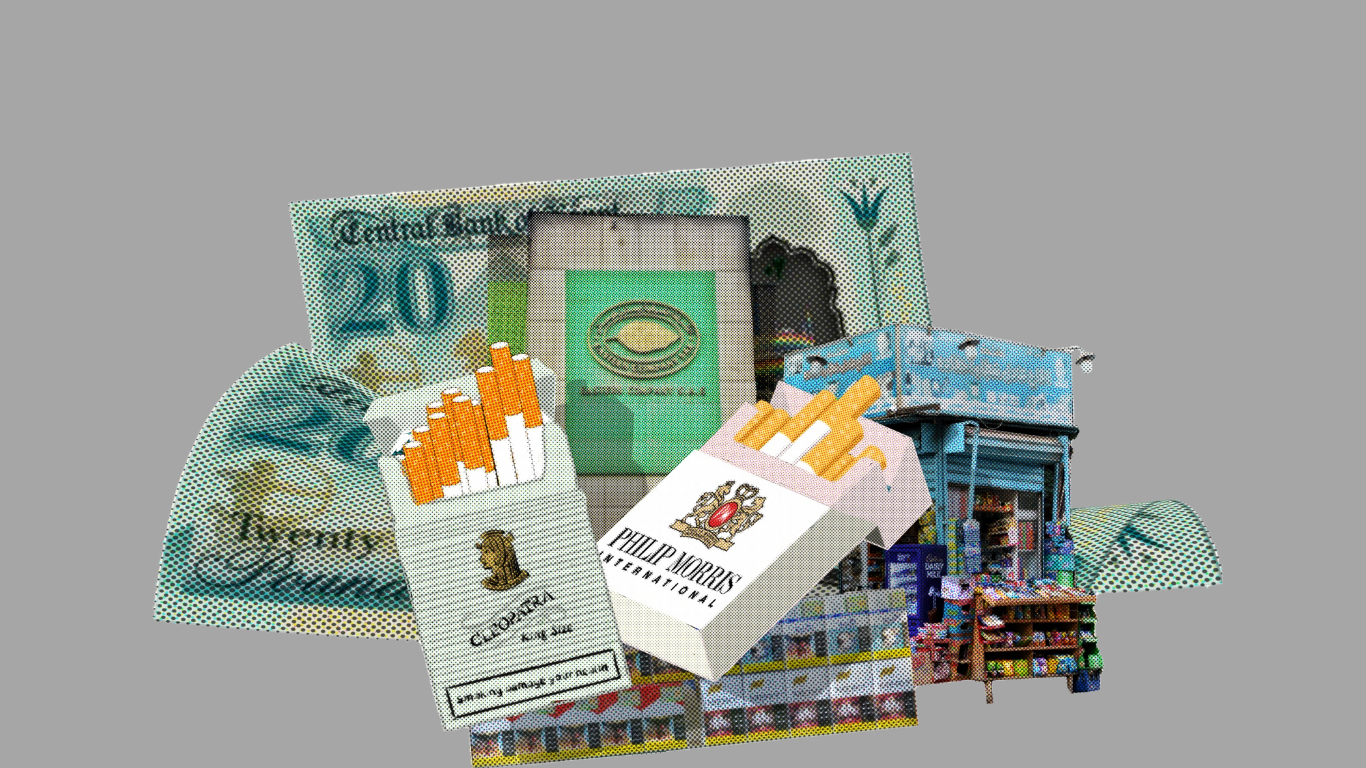“There is political leadership interest in the sugar industry under the supervision of the Minister of Supply and Internal Trade,” stated Ahmed Abu El Yazid, the managing director of the Delta Sugar Company, last May, commenting on official celebrations of the “largest sugar factory in the Middle East.” President Abdel Fattah El-Sisi witnessed the festivities during the Labor Day celebration at this company, known as the “Eastern Company,” located in the new Salheya City. It is an Egyptian joint-stock company that extracts white sugar from sugar beet crops and exports it abroad.
However, it seems that the political leadership’s interest in sugar, one of the essential commodities in Egypt, has not prevented its disappearance from local markets, making it available only on ration cards distributed to the most needy families. This seems to be a prelude to price hikes after market scarcity.
After the disappearance of sugar from the market, Hisham El-Deghawy, the head of the Foodstuffs Department at the Federation of Chambers of Commerce in Giza, denied that there is a crisis in sugar, saying, “There is an abundance of sugar in the country, and there is no disappearance as claimed by some store owners.”
The “sugar bag” has returned to local markets after its prices reached unprecedented levels. The price per kilogram on home delivery applications and the local market reached 50 Egyptian pounds (1.62 dollars), compared to 12 to 15 pounds (0.39 to 0.48 dollars) last year.
Why did prices rise?
In September of last year, the Minister of Supply, Ali El-Meselhi, revealed that Egypt has a strategic stock of sugar sufficient for 7 months. The Ministry of Supply announced the import of 200,000 tons of raw sugar to enhance the strategic reserves of essential commodities for a period of at least 6 months. Hassan El-Fendi, the head of the Sugar Department at the Chamber of Food Industries in the Federation of Industries, stated that the current increase in sugar prices is unjustified. He pointed out that the reason for the increase is the manipulation of some traders within the local market, and exports play a key role in controlling the price, as it affects supply and demand mechanisms, thereby influencing prices.
Ibrahim Ashmawy, the first assistant to the Minister of Supply, attributed the reasons for the sugar price hike to two factors. First, the increase in the stock of sugar by food industries and traders before the month of Ramadan (March 2024) because it is an ingredient in a large number of food products. The second reason is the nearing end of the sugarcane and sugar beet harvesting season. He confirmed that the quantities of sugar supplied match the high demand after importing 100,000 tons of sugar to fill the gap in local production, which covers 90% of consumption. He explained that these reasons led to an increase in sugar demand, resulting in price hikes, noting that Egypt is self-sufficient in sugar by about 87%, and the rest is imported.
Ashmawy clarified that there are three prices for sugar: the first within the supply system, at 12.60 pounds (0.41 dollars), the second within the price reduction initiative by about 27 pounds (0.87 dollars), and the third is the free price, ranging from 34 to more than 40 pounds (1.29 dollars). However, Ashmawy did not address the actual sugar prices in the local market, which reached 50 pounds (1.62 dollars).
The head of the Sugar and Confectionery Department at the Egyptian Industries Federation, Mohamed Raafat, stated that one of the reasons for the rise in sugar prices is “part of the repercussions of inflation and the overall increase in prices.” Raafat added that “some traders’ practices, hoarding goods to create market scarcity, lead to sudden price hikes without clear justification.” The annual inflation rate in Egypt reached 39.7% last month, according to the Central Agency for Public Mobilization and Statistics, which reported a 71.9% annual increase in food prices.
Furthermore, the global price of sugar has witnessed an increase, with the price per ton of raw sugar reaching $737, compared to $539.20 in November of the previous year, according to daily-updated data on the Invising website.
Negative Impacts
The increase in sugar prices in Egypt could cast shadows on several local industries heavily reliant on this essential component. In the confectionery industry, higher sugar prices may lead to an increase in production costs, forcing manufacturers to raise their product prices. It could also impact the soft drinks and juice industry, where large quantities of sugar are used in the production of these beverages.
Moreover, the impact of rising sugar prices extends to the condensed milk and sweetened condensed milk industry, which is used in the composition of many traditional Egyptian foods and sweets. It can also affect the bread and bakery industry, where sugar is widely used in certain types of bread.
Regarding local cafes that offer coffee, tea, and juices, the increase in sugar prices could lead to an increase in the cost of basic ingredients used in preparing these beverages. This effect may be reflected in the prices of beverages consumed by customers, potentially affecting demand and patronage at these cafes.
How is the Egyptian government dealing with the sugar crisis?
In May of the previous year, the Ministry of Supply and Internal Trade reduced the maximum quantities of sugar that a citizen with a ration card can purchase monthly to one kilogram per person, down from the previous 2 kilograms. The government also reduced the maximum limit for one card from 8 to 6 kilograms.
In August of the previous year, the Egyptian government decided to include sugar in the trading on the Egyptian Commodity Exchange by offering quantities of sugar for sale through the commodity exchange platform for the benefit of food industries, distribution and trading companies, and packaging companies, aiming to control prices in the market.
Additionally, in September of the previous year, the Egyptian government decided to extend the ban on the export of sugar in all its forms for another 3 months, ending in the current November. This excludes quantities exceeding the needs of the local market, which are determined by the Ministry of Supply and Internal Trade and will be exported after the approval of the Minister of Trade and Industry.
The Holding Company for Food Industries, an Egyptian joint-stock company headed by Major General Ahmed Hassanein and Vice President Major General Sherif Qalein, accounts for about 60% of the production volume in Egypt through 5 companies that primarily serve the Ministry of Supply. The private sector contributes 40% of the production volume.
Expectations of a decrease and the opposite result
In October of the previous year, several officials in the chambers of commerce expected a decrease in sugar prices by up to 32%, attributing this to government measures by providing large quantities of this strategic commodity on the commodity exchange at a price not exceeding 24,000 pounds per ton. This expectation came after sugar prices in the local market increased by a percentage reaching 105% in just two months. Amr Hamed, the head of the Foodstuffs Department at the Cairo Chamber of Commerce, stated that there are government efforts on the ground to return sugar prices to their normal levels, pointing out that the previous increases were unjustified and resulted from significant manipulations in the local market.
However, it seems that the officials’ expectations were completely wrong, as sugar prices in the local market increased four times the previous price.
Ahmed Fawzi, the deputy head of the Grocery Department at the Cairo Chamber of Commerce, believes that the supervisory authorities should tighten their role to prevent such artificially created crises in strategic commodities in the future. He pointed out that sugar prices are expected to decline very shortly, adding that the increases were very rapid and in a short period, indicating that they will decline at the same pace when government authorities intervene.
Government Initiative to Reduce Prices and Its Contrary Results
In October of last year, Mustafa Madbouly, the Prime Minister, held a meeting to monitor the availability of food commodities in the markets and control prices. The meeting was attended by the Governor of the Central Bank, the Minister of Supply and Internal Trade, the Minister of Finance, the Minister of Agriculture and Land Reclamation, the Minister of Trade and Industry, the Head of the Competition Protection and Prevention of Monopolistic Practices Authority, and others, including presidents and officials from several chambers of commerce, as well as representatives of private companies in the food and trade sectors. They agreed on the necessity of implementing comprehensive solutions to ensure a reduction in the prices of essential commodities to alleviate the burden on citizens.
Following the meeting, they announced the launch of an initiative to reduce the prices of essential commodities by percentages ranging from 15 to 25 percent. Sugar was among the essential commodities targeted, along with beans, lentils, dairy products, pasta, oil, rice, poultry, and eggs.
Members of the House of Representatives believe that the prices of essential commodities continue to witness continuous increases, despite more than a month passing since Prime Minister Mustafa Madbouly launched the initiative to reduce the prices of essential commodities. They point out that their efforts to implement the initiative seriously are ongoing.
Mahmoud Essam, a member of the Human Rights Committee in the House of Representatives, commented on the government’s initiative, stating, “The prices of essential commodities such as poultry, meat, rice, sugar, and other commodities included in the initiative have not decreased but have witnessed continuous increases since the launch of the initiative.”
Sugar Production in Egypt
Egypt ranks 12th globally in sugar production, following several countries led by Brazil, with quantities exceeding 38 million tons annually, according to a report from the U.S. Department of Agriculture. Egypt is one of the largest producers and consumers of sugar due to its dietary pattern. Egypt relies on sugar production from sugarcane and sugar beets, owning several sugar refineries and manufacturing various sugar-related products.
Egypt produces sugar from sugarcane crops covering approximately 320,000 acres annually, while sugar beets are also used in production processes, covering areas of up to 650,000 acres on average annually.
Despite this, Egypt still needs to import about 600-800 thousand tons of sugar annually to cover the high local consumption. Sugar is a basic ingredient in the Egyptian diet, as Egyptians enjoy adding a significant amount of sugar to their tea. It is sold at government supply outlets as part of a massive food support program targeting the poor and widely used in cooking, beverages, and sweets. The sugar consumption volume in Egypt depends on several factors such as population growth and dietary habits.
Inflation and Debt
The Egyptian pound continues to decline significantly against the dollar, especially in the unofficial market, where it has reached over 50 pounds, marking a difference of over 60% compared to the official exchange rate of 30.9 pounds per dollar. Egypt has allowed several rounds of currency devaluation in the past and pledged to move towards a floating exchange rate. Its financing needs remain high at $24 billion in the fiscal year until June 2024, and the current account deficit is expected to double to 2.3% of the gross domestic product.
In the current month, the Central Bank of Egypt announced that the annual rate of core inflation recorded 38.1% in October 2023, down from 39.7% in September 2023.
Egypt is now one of the five countries most at risk of defaulting on its external debt, according to Moody’s agency.
Egypt’s external debt has more than tripled in the past decade, reaching $165.4 billion this year, according to the Ministry of Planning.
After relying on support from Gulf countries in the form of deposits in the central bank for years, Cairo is attempting to sell state assets or launch projects on its land to Gulf investors who now seek “return on investment.”
Since 2017, Egypt has received four loans from the International Monetary Fund to address the dollar shortage and support the budget, but the indicators of recovery from the economic crisis remain negative.
The latest of these loans was last year when the IMF approved a $3 billion loan to enable the Egyptian government to secure other sources of financing, mainly from Gulf countries, which has not happened so far.
Recently, Kristalina Georgieva, Managing Director of the International Monetary Fund, said in statements to Reuters that the fund is seriously considering a potential increase in Egypt’s $3 billion loan program due to the economic difficulties resulting from the war between Israel and Hamas.
Georgieva told Reuters on the sidelines of the Asia-Pacific Economic Cooperation Summit that the conflict is “destroying” the people and economy of Gaza and has “serious effects” on the economy of the West Bank. It also poses difficulties for neighboring countries such as Egypt, Lebanon, Israel, and Jordan through the loss of tourism and rising energy costs.












